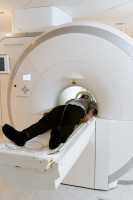
14 Apr Your Questions About MRIs Answered
If you have ever wondered what an MRI is, how it works, and what the point of it is, or you have an MRI coming up, and you want to put your fear at ease, this guide can help. With answers to the most common questions people ask about MRIs, keep reading to discover more.
What is an MRI?
MRI stands for Magnetic Resonance Imaging. It is an imaging tool used by doctors to take pictures inside a patient’s body. MRI machines typically require you to lie in a cylindrical machine so that a 360-cross-section image of the body part can be taken.
An MRI uses hugely strong magnets and computer-generated wavelengths to create images, which are then assessed by a radiologist or specialist.
How long do MRI’s take?
MRI imaging can take anywhere between 15-90 minutes, depending on the body part. The machine needs to create several clear, and readable images or cross-sections of the body part, so it can take a while.
What do MRI’s show?

MRI radiology
MRIs provide specialists with multiple cross sections of a certain body part. These cross sections can then be put together to create a more three-dimensional image of the body, so that specialists can gain a better idea of what is happening or what has gone wrong.
This particular type of scan is often used to identify issues in the brain or neck, where investigative surgery is too risky or where muscles are damaged, rather than bone (which can be examined through an x-ray). MRIs can also help doctors to highlight developmental anomalies within the brain, detect dementia or the impacts of a stroke.
While scans are commonly used for the brain, MRIs can also be used to identify other issues in joints around the body where ligaments and tendons may be causing a problem.
Do I need a referral?
MRIs are often requested for patients in hospital or by a doctor if the cause of an issue is not immediately obvious. However, there are healthcare clinics that offer non-referral MRIs. While these cannot be paid for through insurance, you can choose to have an MRI to provide piece of mind if you are worried about something in particular and do not want to consult your doctor.
How should I prep for an MRI?
Depending on where the MRI is being used, preparations for the scan can differ. Generally speaking, it is recommended that patients do not eat or drink within the 6 hours before the scan. If you are going for an MRI through a referral, your appointment letter will let you know the specifics and whether you will be required to fast.
In terms of clothes, it is important to wear something comfortable and loose fitting. Some patients will be provided with a hospital gown, while others can get away with wearing a t-shirt and joggers.
If you have any metal pins or panels from previous fractures or breaks, do not just assume the examiner knows. It is always worth letting them know before the procedure.
When will I get my results?
It is quite common that you will be sent a different appointment date to discuss the results with a specialist. However, if a radiologist is on site there is the possibility to have your results straight after the scan.
The most important thing is to remember to stay relaxed and calm. You should not experience any pain during the scan so if you are worried or concerned about your health, it is always worth booking in or speaking to your GP.
JOIN OUR EMAIL LIST
[mailpoet_form id="5"]We respect your privacy and will never share your details.
[last-modified]
The information on MedicalResearch.com is provided for educational purposes only, and is in no way intended to diagnose, cure, or treat any medical or other condition. Always seek the advice of your physician or other qualified health and ask your doctor any questions you may have regarding a medical condition. In addition to all other limitations and disclaimers in this agreement, service provider and its third party providers disclaim any liability or loss in connection with the content provided on this website.
Last Updated on January 3, 2023 by Marie Benz MD FAAD
